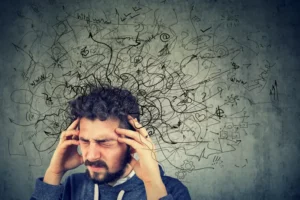Facing challenges with attention deficit hyperactivity disorder? Rest assured, a spectrum of safe and impactful treatments awaits you—and it extends beyond just pills and clinical visits. Dive into this guide and unravel some effective therapy approaches tailored for adults with ADHD. From understanding its nuances to exploring holistic interventions, we’ve got you covered. Ready to find your focus? Let’s journey together.
Contents
Understanding Adult ADHD
 When most people hear “ADHD,” their minds often jump to hyperactive children struggling to sit still. But attention deficit hyperactivity disorder isn’t exclusive to childhood. In fact, many kids with ADHD grow up to be adults with ADHD, and some even get diagnosed for the first time in their mature years.
When most people hear “ADHD,” their minds often jump to hyperactive children struggling to sit still. But attention deficit hyperactivity disorder isn’t exclusive to childhood. In fact, many kids with ADHD grow up to be adults with ADHD, and some even get diagnosed for the first time in their mature years.
Adult ADHD carries its own set of symptoms, often more subtle yet equally disruptive. While children might exhibit hyperactivity by constantly fidgeting or running about, adults may feel an inner restlessness, face difficulty in managing time, or struggle with impulsive decisions. It’s not just about being “distracted” or “forgetful.” It’s about facing ongoing challenges in organizing tasks, prioritizing responsibilities, and following conversations.
What sets adult ADHD apart? It’s often accompanied by other concerns—be it anxiety, mood disorders, or substance misuse. Moreover, life’s responsibilities such as jobs, relationships, and personal obligations can amplify the challenges.
However, by recognizing these manifestations and understanding the distinct nature of adult ADHD, we’re taking the first, crucial step towards effective management and treatment.
Symptoms and Impact on Daily Life
Navigating through the labyrinth of adult responsibilities is challenging enough, but for someone with adult ADHD, it often feels like journeying without a map. The symptoms aren’t just “childish behaviors grown-up”; they manifest uniquely and can significantly affect the quality of daily life.
1. Attention Difficulties: The classic image of ADHD is being easily distracted. For adults, this means challenges in concentrating on tasks, often missing details, forgetting things, or hopping from one activity to another without completion.
2. Hyperactivity: It’s not always about physical restlessness. Adults might experience feelings of being wound up or on edge, leading to excessive talking or the sensation of their thoughts racing.
3. Impulsivity: This can manifest as difficulty waiting one’s turn, interrupting others, or making hasty decisions without considering the repercussions. It might mean impulse buying or jumping into commitments without thought.
Impact on Daily Life:
- Work: Adult ADHD can be a hurdle in maintaining consistent performance at work. It might lead to missed deadlines, overlooked details, or challenges in multitasking.
- Relationships: The impulsivity and hyperactivity can strain personal relationships. It’s not uncommon for individuals with ADHD to be perceived as “unreliable” or “inattentive” by their loved ones.
- Self-Esteem: With the above challenges, many adults with ADHD wrestle with feelings of inadequacy or fears of underachieving. This can lead to a negative cycle of self-doubt and avoidance of tasks.
Recognizing these symptoms and their implications is pivotal. Only by shedding light on the challenges can we pave the way to address them, turning stumbling blocks into stepping stones.
The Importance Of Therapy In Treating ADHD In Adults

Adult ADHD, while challenging, isn’t an insurmountable mountain. Enter therapy, a powerful ally in this journey towards understanding, managing, and thriving despite ADHD. Here’s why it’s a cornerstone in treating adult ADHD:
1. Personalized Coping Strategies: Every individual’s experience with ADHD is unique. Therapy offers a tailored approach, providing tools and techniques best suited for one’s specific challenges, be it time management, impulse control, or emotional regulation.
2. Root Cause Analysis: Beyond just managing symptoms, therapy delves deeper. It seeks to understand the underlying triggers, helping adults with ADHD recognize patterns that exacerbate their symptoms.
3. Emotional Support: Dealing with ADHD isn’t just about managing behaviors; it’s an emotional journey too. Therapists provide a safe space for venting, validation, and support, helping individuals navigate feelings of inadequacy or frustration.
4. Comorbidity Management: ADHD in adults often coexists with other mental health conditions like anxiety or depression. Therapy addresses this intertwined web, ensuring a holistic approach to mental well-being.
5. Skill-building: From enhancing focus to improving organizational skills, therapy offers practical tools that translate to noticeable improvements in daily life.
6. Enhancing Relationships: Through therapy, adults can gain insights into how ADHD affects their interpersonal dynamics. This understanding, combined with communication strategies, can improve relationships both personally and professionally.
In the intricate dance of life, ADHD might seem like an out-of-step rhythm. But with therapy, it’s possible to find harmony, turning the challenges of ADHD into opportunities for growth, understanding, and resilience.
Different Types of Therapy Techniques Used To Treat ADHD
ADHD isn’t a one-size-fits-all condition, and fortunately, neither is its therapeutic approach. Various evidence-based therapy techniques cater to the unique facets of ADHD in adults. Here’s a glimpse into some of the most effective ones:
The Role of Medication in Adult ADHD Treatment
 While therapy is a powerful tool in managing ADHD, medication often plays a pivotal role for many adults. Here’s a closer look:
While therapy is a powerful tool in managing ADHD, medication often plays a pivotal role for many adults. Here’s a closer look:
- Common Medications: Stimulant medications, such as methylphenidate (Ritalin, Concerta) and amphetamines (Adderall, Vyvanse), are frequently prescribed. Non-stimulant medications like atomoxetine (Strattera) and guanfacine (Intuniv) are alternatives for those who don’t respond to or can’t take stimulants.
- Role Alongside Therapy: Medication isn’t a magic pill that erases ADHD, but rather a tool that, when combined with therapy, can be incredibly effective. Therapy provides the strategies and insights to navigate life with ADHD, while medication can offer the neurological support to implement these strategies more effectively.
Remember, the journey with ADHD is personal. While one individual might find immense relief with medication, another might lean more heavily on therapeutic techniques. The key is to find the balance that works best for the individual, ensuring a holistic approach to managing and thriving with adult ADHD.
Cognitive Behavioral Therapy (CBT) for ADHD
 Cognitive Behavioral Therapy, commonly referred to as CBT, has been hailed as a transformative therapeutic approach for a myriad of conditions. For adults with ADHD, CBT is tailored to address the unique challenges they face. This includes managing procrastination, enhancing organizational skills, improving time management, and dealing with impulsivity.
Cognitive Behavioral Therapy, commonly referred to as CBT, has been hailed as a transformative therapeutic approach for a myriad of conditions. For adults with ADHD, CBT is tailored to address the unique challenges they face. This includes managing procrastination, enhancing organizational skills, improving time management, and dealing with impulsivity.
- Techniques Involved:
- Self-Monitoring: Individuals learn to be more aware of their symptoms and triggers. This could mean recognizing when they’re becoming distracted and implementing strategies to refocus.
- Behavioral Activation: Here, individuals are encouraged to schedule tasks, break them down into smaller steps, and use reminders to ensure they’re completed.
- Skill Training: This can involve learning new organizational techniques, strategies to enhance focus, or tools to manage impulsivity.
- Cognitive Restructuring: It’s not uncommon for adults with ADHD to harbor negative beliefs about themselves. This technique helps reshape those beliefs, allowing for a more positive self-view.
Dialectical Behavior Therapy (DBT)
Focus: DBT emphasizes emotional regulation and interpersonal effectiveness.
Benefits for ADHD: Enhances emotional self-awareness, impulse control, and improves relationship dynamics.
Psychoeducation
Focus: This involves educating individuals about ADHD and its impacts.
Benefits: Understanding the condition can alleviate feelings of guilt or shame and empower individuals to seek and implement coping strategies.
Coaching
Focus: ADHD coaching focuses on daily skills and goal-setting.
Benefits: Provides practical strategies for time management, prioritizing tasks, and setting achievable targets.
Neurofeedback
Focus: Utilizes real-time displays of brain activity to teach self-regulation.
Benefits: Can improve attention, reduce impulsivity, and enhance overall brain function.
Group Therapy
Focus: Facilitates discussions amongst multiple individuals facing similar challenges.
Benefits: Provides peer support, shared coping techniques, and reduces feelings of isolation.
The journey with ADHD is a personal one, and the therapy technique that works best may vary. But with this arsenal of effective therapy approaches, adults with ADHD have multiple avenues to explore, ensuring they find the best fit to navigate their challenges and thrive.
But Which Is The Best Therapy For ADHD?
Navigating the world of therapy options can be overwhelming, especially when seeking the most effective approach for ADHD. While various techniques offer unique benefits, Cognitive Behavioral Therapy (CBT) consistently emerges as a frontrunner, especially for adults. CBT’s structured, goal-oriented nature aligns seamlessly with the challenges ADHD presents. It directly addresses the negative thought patterns and behaviors associated with ADHD, offering tangible strategies to manage impulsivity, enhance organizational skills, and counter procrastination. Moreover, adults often grapple with years, sometimes decades, of ingrained behaviors and self-beliefs related to their ADHD. CBT provides the tools to reframe these beliefs, fostering a more positive self-image and a proactive approach to challenges.
How To Find The Right Fit Near You?
 Finding the perfect therapist to guide you through your ADHD journey can seem daunting, but with the right approach, you’ll have a supportive ally in no time. Here’s a roadmap to ensure you find that ideal fit:
Finding the perfect therapist to guide you through your ADHD journey can seem daunting, but with the right approach, you’ll have a supportive ally in no time. Here’s a roadmap to ensure you find that ideal fit:
1. Identify Your Needs:
Before diving into your search, take a moment to outline what you’re specifically looking for. Are you interested in individual sessions, group therapy, or perhaps both?
2. Research and Recommendations:
Begin by asking friends or family for recommendations. Word of mouth can be powerful. You can also explore online platforms like TherapyMantra, which hosts a range of qualified therapists with specialized expertise in ADHD.
3. Check Credentials:
Ensure your potential therapist is licensed and has experience in treating ADHD in adults. Specialized training means they’re equipped with the tools to help you navigate your unique challenges.
4. Consider Logistics:
Location, availability, and cost are vital. With platforms like TherapyMantra, you can even opt for online sessions, offering flexibility and comfort from your own home.
5. Initial Consultation:
Many therapists offer a preliminary session. Use this opportunity to gauge your comfort level with them and discuss your needs and expectations.
6. Trust Your Instincts:
Therapy is a deeply personal journey. If something feels off or you’re not connecting, it’s okay to explore other options until you find that perfect fit.
Remember, the right therapist can make a world of difference in your ADHD journey. With platforms like TherapyMantra, the path to personalized care has never been smoother. Why wait? Take the first step towards a brighter, more focused future today.
Conclusion
Living with ADHD as an adult comes with its set of unique challenges. Yet, remember that you’re not alone in this journey, and help is within reach. With the right therapy and support, you can harness your strengths, overcome hurdles, and lead a fulfilling life. If you’re grappling with ADHD-related issues and seeking a guiding hand, don’t hesitate. Online ADHD Counseling at TherapyMantra is here to support you. Book a trial Online therapy session today and embark on a transformative path towards well-being and clarity.


